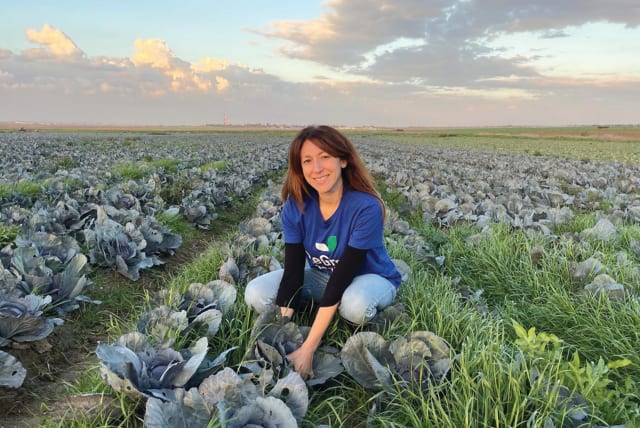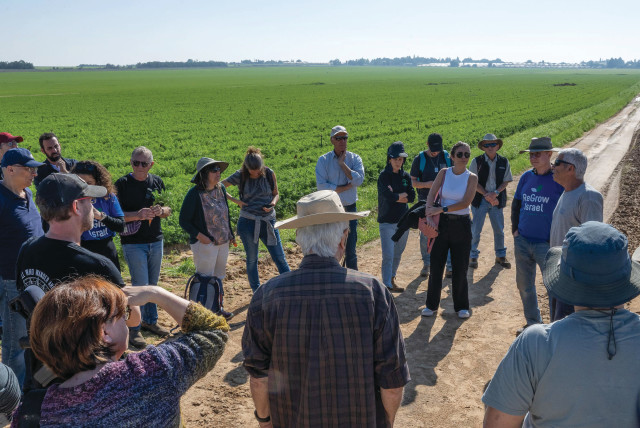'In Israel, we have everything we need to save ourselves'

Danielle Abraham of Volcani International Partnerships says Hamas targeted farms on Oct. 7, aiming to harm Israel’s food supply and ‘break the agricultural communities’
So many words have been written about the tragedy of Oct. 7, but there was another form of devastation that Hamas unleashed on Israel that day that might not be as widely recognized. Danielle Abraham, the executive director of Volcani International Partnerships (VIP), calls it “agricultural terrorism.”
Following the events of that tragic day, VIP launched ReGrow Israel: a national agricultural initiative to secure the future of all the farming communities across the Western Negev.
Abraham, a British-born young Israeli mother of two living in Tel Aviv, was confused and scared on Oct. 7. “I have two kids with no shelter. They were super stressed by the sirens. My mother called and asked me to get on a plane and come to her,” she tells me when we talk about “ReGrow Israel.” But she couldn’t stay away for long.
A renowned advocate for Israeli agricultural innovation, Abraham is a sought-after speaker at prestigious global events, from Harvard University, the World Food Prize, and the Milken Conference to the UN.
Having started her career in Israel at the Foreign Ministry, she holds a B.A. and an M.A. from the University of Oxford. She also sits on the board of ELNET.
“I grew up in London in a Zionist house,” she said. “We used to come to Israel every year with my grandparents and it was amazing. After graduating from Oxford University, I worked for the British government despite watching Yes Prime Minister [the famous British sitcom about battling bureaucracy working in the government]. When I realized I was living [the sitcom], I thought, ‘my God, it was awful,’ and had to get out.”
Abraham related that when she attended a Limmud [Jewish learning festival] for a long weekend, an elderly gentleman got up on stage. “He was telling his life story and how he was tasked, back in the good old days of [Israel’s first prime minister] David Ben-Gurion and Golda Meir, with setting up the agricultural aid arm of the State of Israel. I said to myself that when I grow up, I want to do it.”
She went to speak to him and he encouraged her to come to Israel. “I went home and I told my family that I was going to sell my car and quit my job, which was a very prestigious job, and move to Israel.”
ARRIVING IN Israel, Abraham joined the Foreign Ministry. “It was a very different experience. I lasted about four years. And then I got a call from Amir Ganor, who used to be head of HR at the Foreign Ministry. He went to work at Volcani Institute and he asked me to come for a meeting with the Director General Prof. Yoram Kapulnik.”
“The Volcani Institute is part of the Agriculture Ministry,” she said. “It is a scientific institute driving Israel’s agricultural innovation. Every time there’s a high-level delegation to Israel, after doing the standard route, on the way to the airport, they stop at Volcani because it’s the beautiful face of Israel and it’s amazing.”
Abraham realized that the institute was not designed primarily to help other countries using the knowledge gathered there. “Volcani is a scientific research institute and scientists need to stay in the lab to remain at the forefront of innovation. That’s when I told Kapulnik that if he agreed with my vision, I would come on board the NGO [Volcani International Partnerships], and fundraise for strategically important innovation projects in Israel, and also focus on tackling global hunger with Israeli expertise.
Volcani International Partnerships (VIP), is a veteran Israeli agricultural non-profit organization on a mission to promote local agricultural expertise for the benefit of Israel and the world. Prior to Oct. 7, VIP’s work was increasingly focused on its international activities. But that horrific day changed everything. At the request of the farmers in the western Negev who are facing an unprecedented agricultural crisis, the partnership launched a new initiative called ReGrow Israel, which is on a mission to secure the future of the farming communities targeted on Oct. 7.
“We set three key pillars of work,” Abraham said. “One is advancing Israeli agriculture innovation through funding strategic research – offering scholarships, working with farmers and agri-tech companies in Israel, and pushing Israel to be at the front. Two, we focus on global issues working with governments or big international actors to create an enabling environment for agriculture, and three, supporting the farmers themselves. For instance, in Malawi, where we’re currently working with farmers, they got tomato seeds from Israel, they had just finished their first harvest and they message me every Sunday saying they’re praying for Israel.”
A few days after the massacre, Volcani VIP had their annual General Assembly, and war or not, Abraham had to keep it. “Everyone was asking why we haven’t pivoted to do something to save Israeli agriculture, and the idea of the ReGrow Israel Fund came to be,” she said.
ReGrow
The ReGrow Israel initiative is dedicated to saving and strengthening the devastated farming communities in the Western Negev. Volcani International Partners and Western Negev Farmers (“Mishkey HaNegev”) launched ReGrow Israel – an emergency fund to restore and rebuild farming communities hardest hit on Oct. 7.
The initiative seeks to raise over $50 million. The communities that live and farm in the Western Negev region will lead the assessment of needs and allocation of dollars with support from scientists, agronomists, and technology leaders from around the world.
Abraham: “I got the who’s who of Israeli agriculture together – people that we work with anyway. Everyone was asking ‘what are we going to do as an NGO? What’s actually needed?’”
During one of her trips to the South to meet with the farmers, the head of agriculture in Nahal Oz, Moran Freibach, said something that changed Abraham’s understanding. “He said ‘Agriculture wasn’t collateral damage, it was a deliberate target.’”
Freibach described the precise, coordinated, and systematic nature of Hamas’s agricultural terrorism. The terrorists targeted farmlands, livestock, plants, and infrastructure while moving through the Western Negev. This region is a crucial contributor, responsible for about 70% of the country’s vegetables, 20% of its fruit, and 6% of its milk.
The terrorists’ actions left a devastating impact on the land, resulting in widespread destruction. Greenhouses and barns were vandalized, with many rendered irreparable. The deployment of Israeli tanks for counteraction further worsened the situation, causing soil compaction and pollution, damaging approximately 10% of the area’s previously fertile land. The emotional toll on the affected community was immeasurable.
“Before Oct. 7 we were tackling global hunger with Israeli agricultural expertise and just pushing the innovation piece here,” continues Abraham. “On Oct. 7, we understood that there was a huge agricultural crisis at home – and how can you turn a blind eye to that? So we try to understand what value we can bring.
“They came with hammers and deliberately targeted key taps to flood orchards. They massacred and abducted foreign workers to undermine a vital source of labor for the agricultural sector. They went straight for the computer chips that regulate entire irrigation systems. Hamas attacked the symbols of Israel, the blooming desert, a national symbol of innovation and resilience that lies at the heart of the idea of Zionism.
“We have to rebuild the communities in the Western Negev, and it starts with agriculture,” Abraham said. “This is true Zionism and of course, it is Israel’s food security. Right now, the farmers need us. But the truth is all of us need them. We need them to produce our food. We need them to look after our environment.”
PIVOTING VIP’s efforts towards helping Israeli farmers, Abraham is working to create an inventory of equipment stolen from the region. Not counting on the government to replace all that was lost, she hopes philanthropy will help farmers fill the gaps.
“We can’t start off building resilience and helping them grow stronger if they can’t even start where they were without entering loads of debt,” she said.
“We split into three key initiatives. One is about economic resilience: How do we ensure that farmers are more profitable? We’ve identified two key factors. The first is reducing dependence on manual labor through automation – and the technologies are there, some are almost ready to go, and others are in a pipeline. The second factor is introducing more profitable crops. Some of the crops, like potatoes, are very low profit and if you grow something else, say avocado, you can make a lot more profit,” Abraham said.
“The second initiative is promoting environmental sustainability, and handling the waste. There’s more than double the greenhouse plastic in that area than anywhere else in the country. And you’ve got the organic waste and the waste from the livestock.”
The experts meet every week, she said. “They’re divided into groups according to the challenge that we saw on the ground. We’ve got a special expert committee on the automation of greenhouses, a special expert committee on the circular economy, and an expert committee just on the soil according to all the needs and opportunities we’ve built. I say the farmers and experts together have to learn what’s available and design the right program they wish to test.”
THE ENVIRONMENTAL sustainability issue is huge. Everything to do with climate-resilient agriculture, sustainable agriculture on the edge of the desert, and the use of water, can all be improved.
Abraham is looking at innovations that will serve the actual needs of the farmer. “The idea is to design a revolving philanthropic fund where we would give the farmers a grant to buy whatever they need – it could be sensors or a new technology for the greenhouse – and once it’s up and running, move the capital back into the fund when it is profitable. Hopefully, it will help accelerate the integration of more technologies and more education in time.”
Getting the voices of the farmers heard and giving them the credit they deserve is important,” she said. “Look at who they are and what they’re doing. We should value the farmers more. I know right now they need us, but we really need them – we do. Globally, we need them.
The farmers are too humble and busy working the land, so they do not speak out, says Abraham. “But they are heroes. Heroes do not always wear uniforms. They’re also the farmers who went back almost immediately and just started working in trauma, in mourning, under fire. The farmers are heroes.
“One of the things Israel can teach the world is that it is all about technology and climate resilience,” Abraham says, quoting Israel’s first prime minister, David Ben-Gurion, who said many times that Israel’s future lies in the Negev. “The opportunity here is not just to go back to where we were, but to emerge stronger. And that’s our strategic plan – economic resilience, environmental sustainability, and innovation initiatives.
“In Israel, we have everything we need to save ourselves. We just need to put it all together – and the world can watch and learn how we are going to grow back stronger. It’s going to have all the solutions, approaches, and innovations. This is agriculture on the edge of the desert again.”
For more information and support, go to www.regrowisrael.org
Jerusalem Post Store
`; document.getElementById("linkPremium").innerHTML = cont; var divWithLink = document.getElementById("premium-link"); if (divWithLink !== null && divWithLink !== 'undefined') { divWithLink.style.border = "solid 1px #cb0f3e"; divWithLink.style.textAlign = "center"; divWithLink.style.marginBottom = "15px"; divWithLink.style.marginTop = "15px"; divWithLink.style.width = "100%"; divWithLink.style.backgroundColor = "#122952"; divWithLink.style.color = "#ffffff"; divWithLink.style.lineHeight = "1.5"; } } (function (v, i) { });

